PS765 Critical Report: Ethical and Practical Issues in Interviews
VerifiedAdded on 2022/12/28
|7
|1845
|51
Report
AI Summary
This report critically examines ethical and practical problems observed in a simulated forensic interview involving a forensic psychologist and an individual with a learning difficulty. The report identifies key issues such as the lack of adherence to ethical codes of conduct, ineffective communication and collaboration between the clinician and the individual, and inadequate consideration of the individual's needs and vulnerabilities, particularly regarding their intellectual disability. It links these problems to relevant theories and research, including the theory of mind, and discusses the impact of these issues on the interview's effectiveness. The report also includes a reflective account, applying the Driscoll model to evaluate the situation and consider alternative approaches, such as improved communication strategies, consideration of the individual's dignity and respect, and the inclusion of other agencies in the decision-making process. The report emphasizes the need for forensic psychologists to possess strong professional practice skills and ethical awareness to effectively address the needs of vulnerable individuals within the criminal justice system.
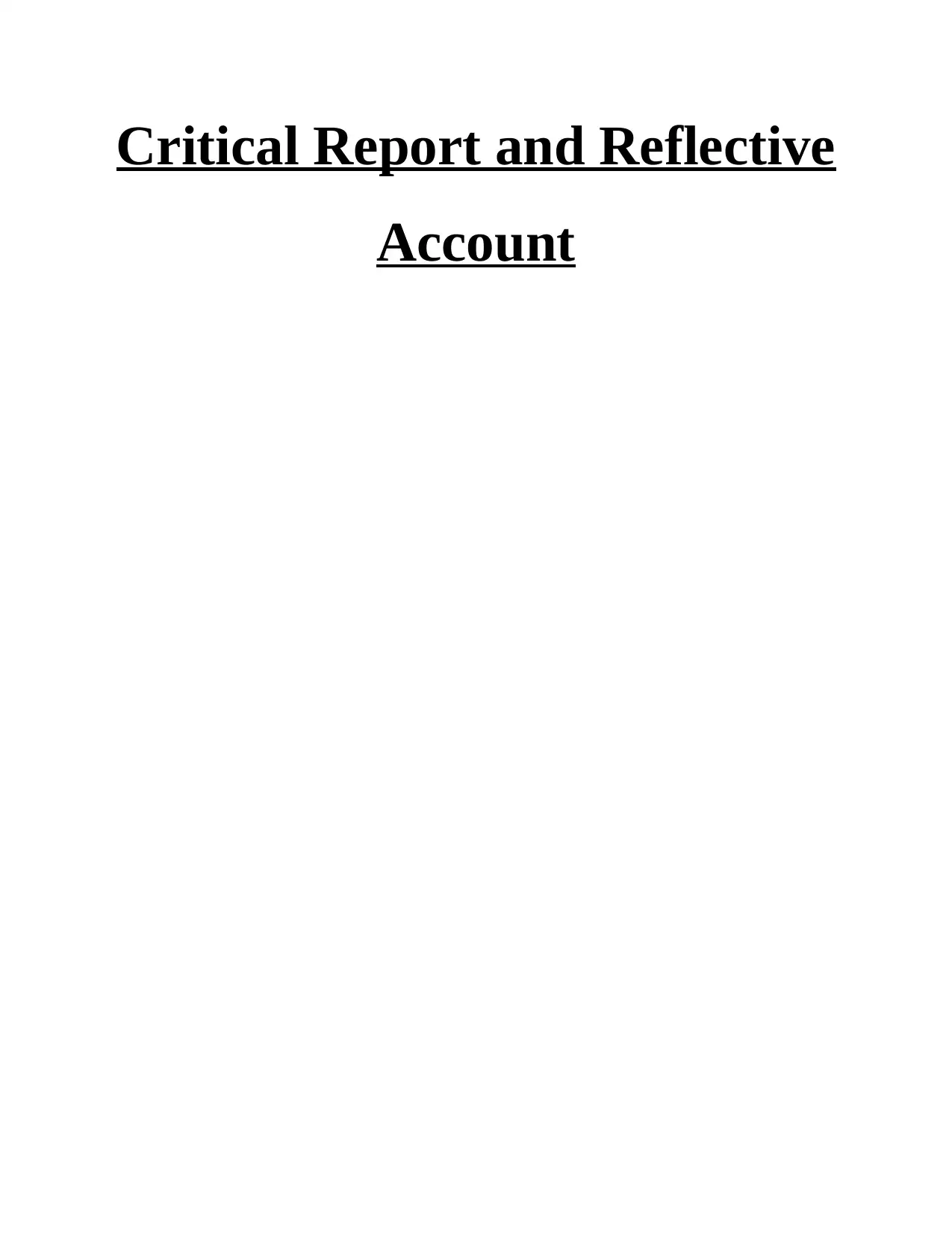
Critical Report and Reflective
Account
Account
Paraphrase This Document
Need a fresh take? Get an instant paraphrase of this document with our AI Paraphraser
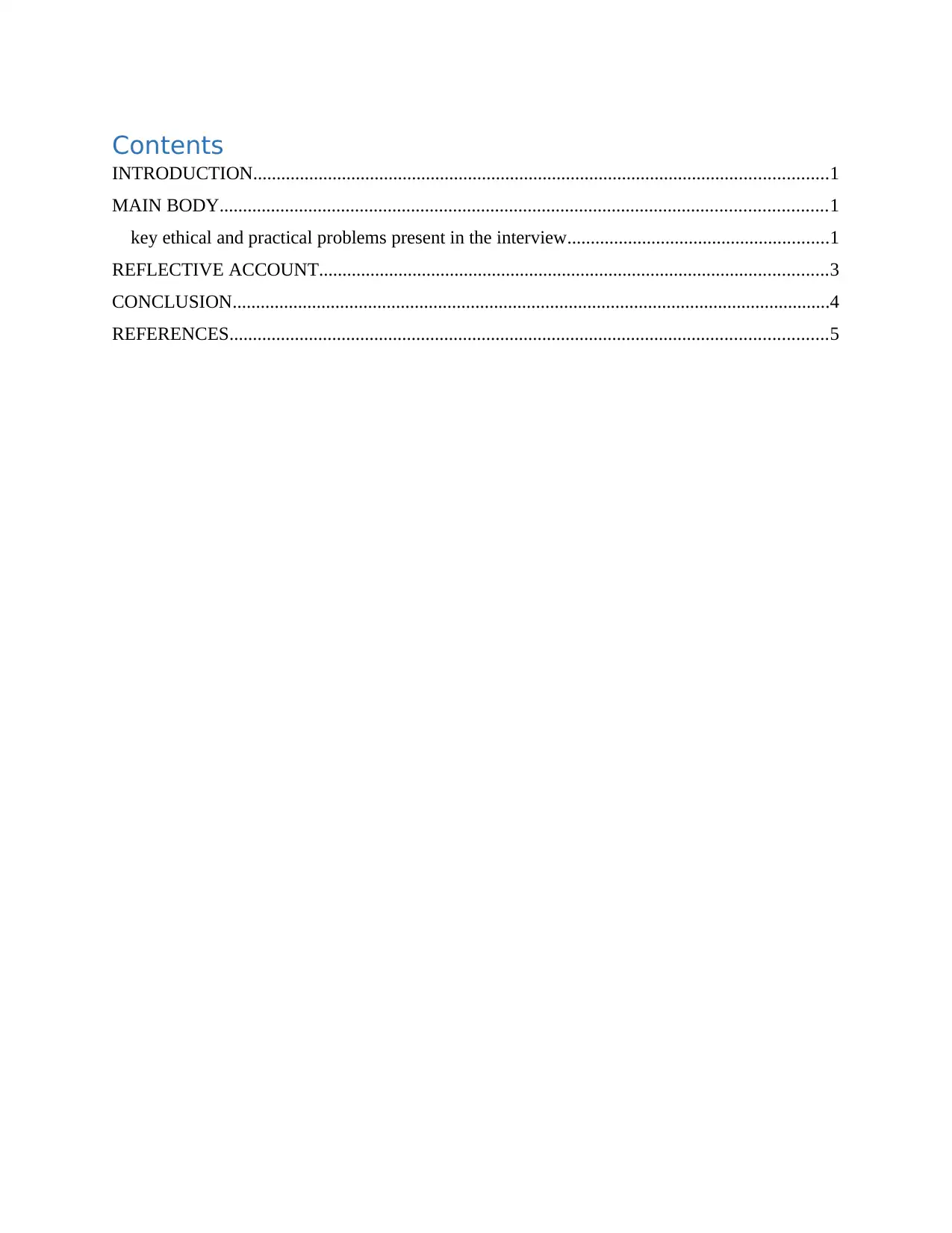
Contents
INTRODUCTION...........................................................................................................................1
MAIN BODY..................................................................................................................................1
key ethical and practical problems present in the interview........................................................1
REFLECTIVE ACCOUNT.............................................................................................................3
CONCLUSION................................................................................................................................4
REFERENCES................................................................................................................................5
INTRODUCTION...........................................................................................................................1
MAIN BODY..................................................................................................................................1
key ethical and practical problems present in the interview........................................................1
REFLECTIVE ACCOUNT.............................................................................................................3
CONCLUSION................................................................................................................................4
REFERENCES................................................................................................................................5
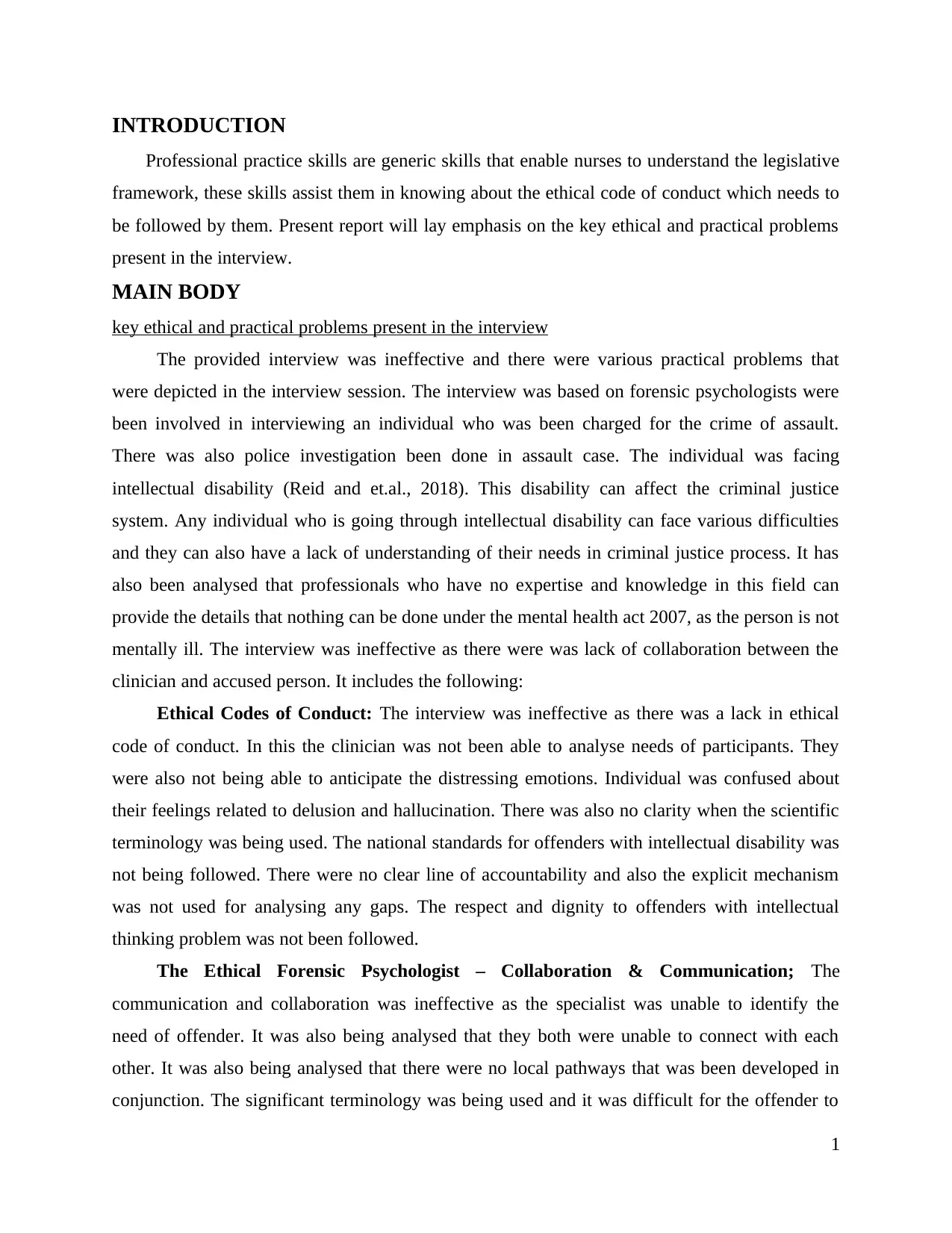
INTRODUCTION
Professional practice skills are generic skills that enable nurses to understand the legislative
framework, these skills assist them in knowing about the ethical code of conduct which needs to
be followed by them. Present report will lay emphasis on the key ethical and practical problems
present in the interview.
MAIN BODY
key ethical and practical problems present in the interview
The provided interview was ineffective and there were various practical problems that
were depicted in the interview session. The interview was based on forensic psychologists were
been involved in interviewing an individual who was been charged for the crime of assault.
There was also police investigation been done in assault case. The individual was facing
intellectual disability (Reid and et.al., 2018). This disability can affect the criminal justice
system. Any individual who is going through intellectual disability can face various difficulties
and they can also have a lack of understanding of their needs in criminal justice process. It has
also been analysed that professionals who have no expertise and knowledge in this field can
provide the details that nothing can be done under the mental health act 2007, as the person is not
mentally ill. The interview was ineffective as there were was lack of collaboration between the
clinician and accused person. It includes the following:
Ethical Codes of Conduct: The interview was ineffective as there was a lack in ethical
code of conduct. In this the clinician was not been able to analyse needs of participants. They
were also not being able to anticipate the distressing emotions. Individual was confused about
their feelings related to delusion and hallucination. There was also no clarity when the scientific
terminology was being used. The national standards for offenders with intellectual disability was
not being followed. There were no clear line of accountability and also the explicit mechanism
was not used for analysing any gaps. The respect and dignity to offenders with intellectual
thinking problem was not been followed.
The Ethical Forensic Psychologist – Collaboration & Communication; The
communication and collaboration was ineffective as the specialist was unable to identify the
need of offender. It was also being analysed that they both were unable to connect with each
other. It was also being analysed that there were no local pathways that was been developed in
conjunction. The significant terminology was being used and it was difficult for the offender to
1
Professional practice skills are generic skills that enable nurses to understand the legislative
framework, these skills assist them in knowing about the ethical code of conduct which needs to
be followed by them. Present report will lay emphasis on the key ethical and practical problems
present in the interview.
MAIN BODY
key ethical and practical problems present in the interview
The provided interview was ineffective and there were various practical problems that
were depicted in the interview session. The interview was based on forensic psychologists were
been involved in interviewing an individual who was been charged for the crime of assault.
There was also police investigation been done in assault case. The individual was facing
intellectual disability (Reid and et.al., 2018). This disability can affect the criminal justice
system. Any individual who is going through intellectual disability can face various difficulties
and they can also have a lack of understanding of their needs in criminal justice process. It has
also been analysed that professionals who have no expertise and knowledge in this field can
provide the details that nothing can be done under the mental health act 2007, as the person is not
mentally ill. The interview was ineffective as there were was lack of collaboration between the
clinician and accused person. It includes the following:
Ethical Codes of Conduct: The interview was ineffective as there was a lack in ethical
code of conduct. In this the clinician was not been able to analyse needs of participants. They
were also not being able to anticipate the distressing emotions. Individual was confused about
their feelings related to delusion and hallucination. There was also no clarity when the scientific
terminology was being used. The national standards for offenders with intellectual disability was
not being followed. There were no clear line of accountability and also the explicit mechanism
was not used for analysing any gaps. The respect and dignity to offenders with intellectual
thinking problem was not been followed.
The Ethical Forensic Psychologist – Collaboration & Communication; The
communication and collaboration was ineffective as the specialist was unable to identify the
need of offender. It was also being analysed that they both were unable to connect with each
other. It was also being analysed that there were no local pathways that was been developed in
conjunction. The significant terminology was being used and it was difficult for the offender to
1
⊘ This is a preview!⊘
Do you want full access?
Subscribe today to unlock all pages.

Trusted by 1+ million students worldwide
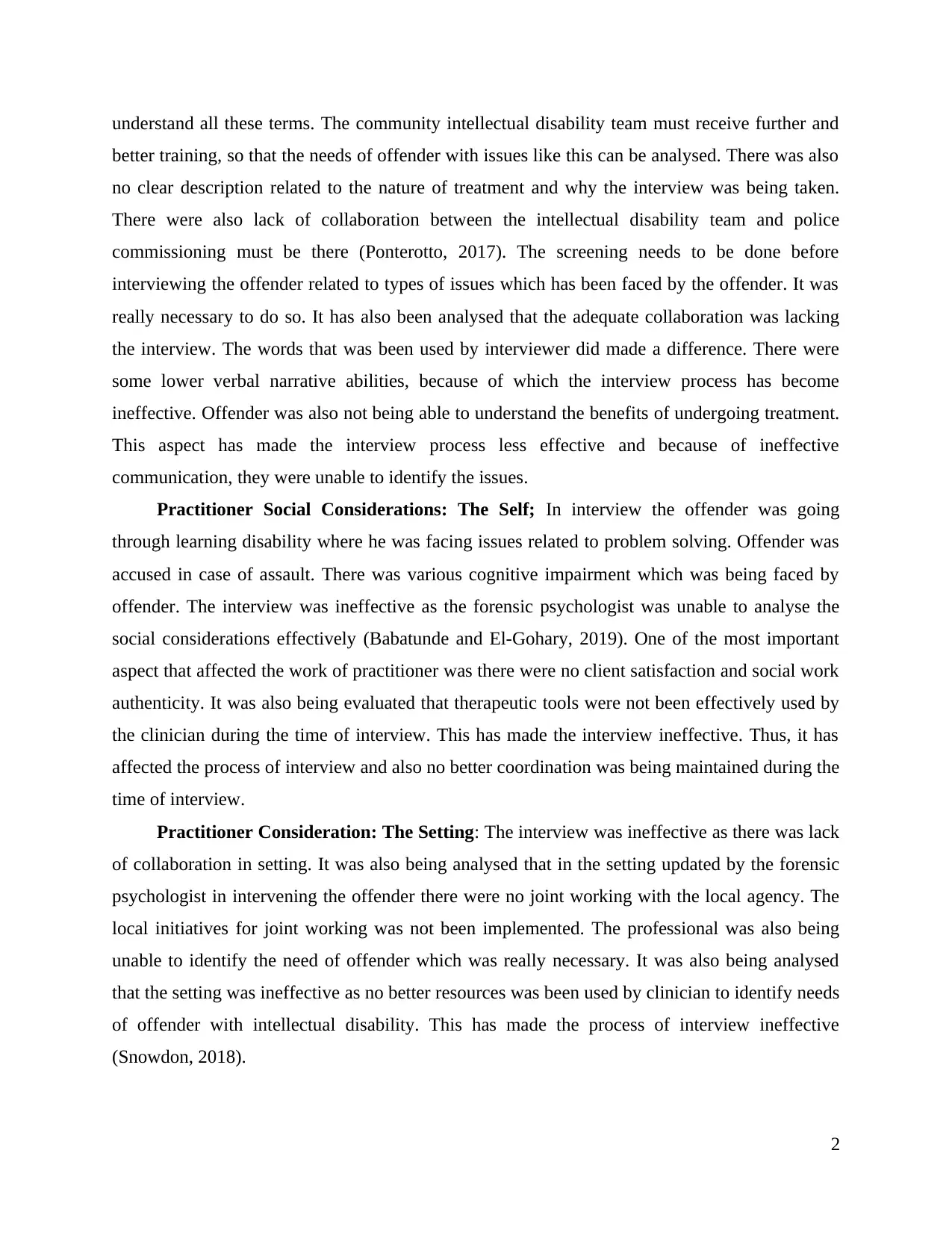
understand all these terms. The community intellectual disability team must receive further and
better training, so that the needs of offender with issues like this can be analysed. There was also
no clear description related to the nature of treatment and why the interview was being taken.
There were also lack of collaboration between the intellectual disability team and police
commissioning must be there (Ponterotto, 2017). The screening needs to be done before
interviewing the offender related to types of issues which has been faced by the offender. It was
really necessary to do so. It has also been analysed that the adequate collaboration was lacking
the interview. The words that was been used by interviewer did made a difference. There were
some lower verbal narrative abilities, because of which the interview process has become
ineffective. Offender was also not being able to understand the benefits of undergoing treatment.
This aspect has made the interview process less effective and because of ineffective
communication, they were unable to identify the issues.
Practitioner Social Considerations: The Self; In interview the offender was going
through learning disability where he was facing issues related to problem solving. Offender was
accused in case of assault. There was various cognitive impairment which was being faced by
offender. The interview was ineffective as the forensic psychologist was unable to analyse the
social considerations effectively (Babatunde and El-Gohary, 2019). One of the most important
aspect that affected the work of practitioner was there were no client satisfaction and social work
authenticity. It was also being evaluated that therapeutic tools were not been effectively used by
the clinician during the time of interview. This has made the interview ineffective. Thus, it has
affected the process of interview and also no better coordination was being maintained during the
time of interview.
Practitioner Consideration: The Setting: The interview was ineffective as there was lack
of collaboration in setting. It was also being analysed that in the setting updated by the forensic
psychologist in intervening the offender there were no joint working with the local agency. The
local initiatives for joint working was not been implemented. The professional was also being
unable to identify the need of offender which was really necessary. It was also being analysed
that the setting was ineffective as no better resources was been used by clinician to identify needs
of offender with intellectual disability. This has made the process of interview ineffective
(Snowdon, 2018).
2
better training, so that the needs of offender with issues like this can be analysed. There was also
no clear description related to the nature of treatment and why the interview was being taken.
There were also lack of collaboration between the intellectual disability team and police
commissioning must be there (Ponterotto, 2017). The screening needs to be done before
interviewing the offender related to types of issues which has been faced by the offender. It was
really necessary to do so. It has also been analysed that the adequate collaboration was lacking
the interview. The words that was been used by interviewer did made a difference. There were
some lower verbal narrative abilities, because of which the interview process has become
ineffective. Offender was also not being able to understand the benefits of undergoing treatment.
This aspect has made the interview process less effective and because of ineffective
communication, they were unable to identify the issues.
Practitioner Social Considerations: The Self; In interview the offender was going
through learning disability where he was facing issues related to problem solving. Offender was
accused in case of assault. There was various cognitive impairment which was being faced by
offender. The interview was ineffective as the forensic psychologist was unable to analyse the
social considerations effectively (Babatunde and El-Gohary, 2019). One of the most important
aspect that affected the work of practitioner was there were no client satisfaction and social work
authenticity. It was also being evaluated that therapeutic tools were not been effectively used by
the clinician during the time of interview. This has made the interview ineffective. Thus, it has
affected the process of interview and also no better coordination was being maintained during the
time of interview.
Practitioner Consideration: The Setting: The interview was ineffective as there was lack
of collaboration in setting. It was also being analysed that in the setting updated by the forensic
psychologist in intervening the offender there were no joint working with the local agency. The
local initiatives for joint working was not been implemented. The professional was also being
unable to identify the need of offender which was really necessary. It was also being analysed
that the setting was ineffective as no better resources was been used by clinician to identify needs
of offender with intellectual disability. This has made the process of interview ineffective
(Snowdon, 2018).
2
Paraphrase This Document
Need a fresh take? Get an instant paraphrase of this document with our AI Paraphraser
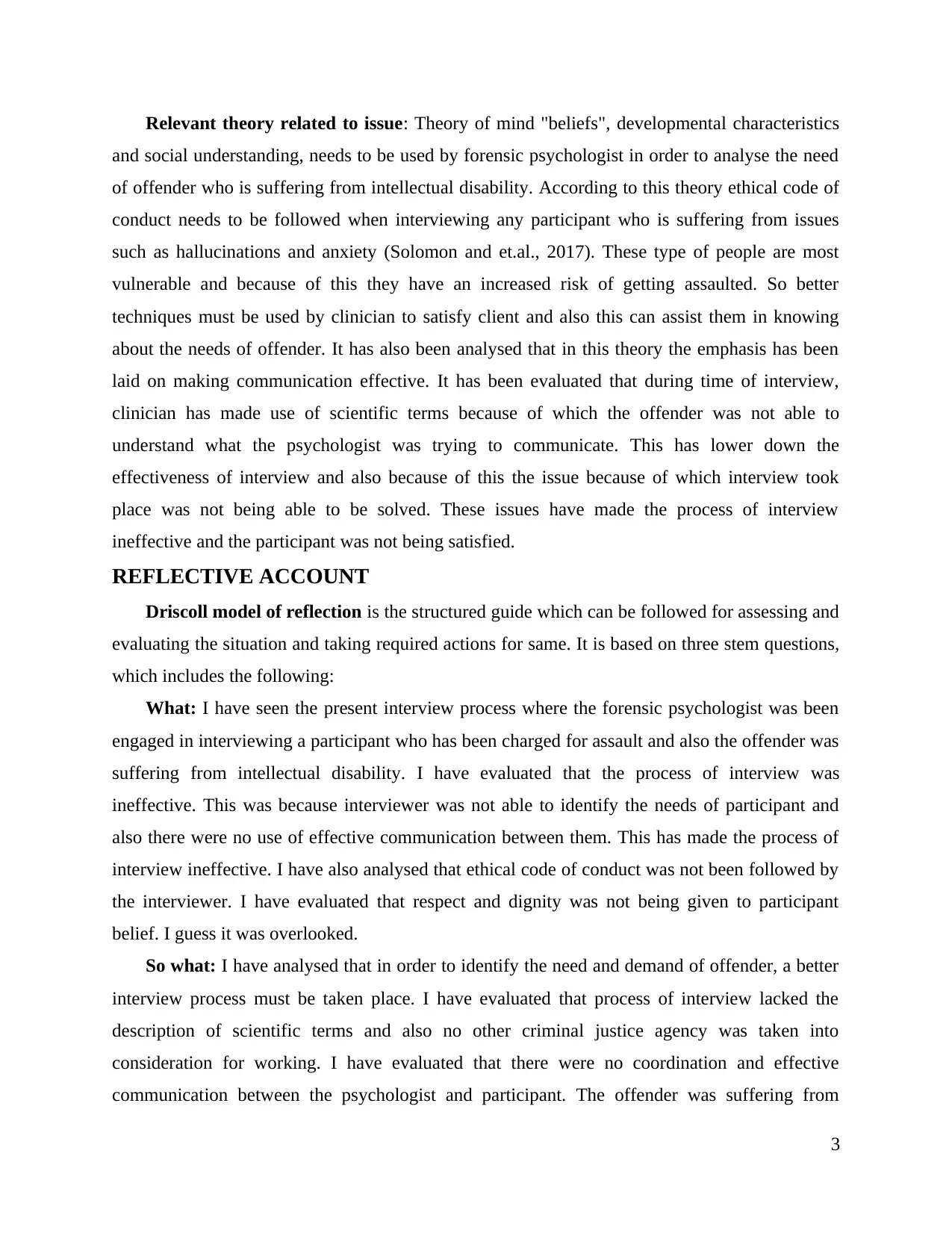
Relevant theory related to issue: Theory of mind "beliefs", developmental characteristics
and social understanding, needs to be used by forensic psychologist in order to analyse the need
of offender who is suffering from intellectual disability. According to this theory ethical code of
conduct needs to be followed when interviewing any participant who is suffering from issues
such as hallucinations and anxiety (Solomon and et.al., 2017). These type of people are most
vulnerable and because of this they have an increased risk of getting assaulted. So better
techniques must be used by clinician to satisfy client and also this can assist them in knowing
about the needs of offender. It has also been analysed that in this theory the emphasis has been
laid on making communication effective. It has been evaluated that during time of interview,
clinician has made use of scientific terms because of which the offender was not able to
understand what the psychologist was trying to communicate. This has lower down the
effectiveness of interview and also because of this the issue because of which interview took
place was not being able to be solved. These issues have made the process of interview
ineffective and the participant was not being satisfied.
REFLECTIVE ACCOUNT
Driscoll model of reflection is the structured guide which can be followed for assessing and
evaluating the situation and taking required actions for same. It is based on three stem questions,
which includes the following:
What: I have seen the present interview process where the forensic psychologist was been
engaged in interviewing a participant who has been charged for assault and also the offender was
suffering from intellectual disability. I have evaluated that the process of interview was
ineffective. This was because interviewer was not able to identify the needs of participant and
also there were no use of effective communication between them. This has made the process of
interview ineffective. I have also analysed that ethical code of conduct was not been followed by
the interviewer. I have evaluated that respect and dignity was not being given to participant
belief. I guess it was overlooked.
So what: I have analysed that in order to identify the need and demand of offender, a better
interview process must be taken place. I have evaluated that process of interview lacked the
description of scientific terms and also no other criminal justice agency was taken into
consideration for working. I have evaluated that there were no coordination and effective
communication between the psychologist and participant. The offender was suffering from
3
and social understanding, needs to be used by forensic psychologist in order to analyse the need
of offender who is suffering from intellectual disability. According to this theory ethical code of
conduct needs to be followed when interviewing any participant who is suffering from issues
such as hallucinations and anxiety (Solomon and et.al., 2017). These type of people are most
vulnerable and because of this they have an increased risk of getting assaulted. So better
techniques must be used by clinician to satisfy client and also this can assist them in knowing
about the needs of offender. It has also been analysed that in this theory the emphasis has been
laid on making communication effective. It has been evaluated that during time of interview,
clinician has made use of scientific terms because of which the offender was not able to
understand what the psychologist was trying to communicate. This has lower down the
effectiveness of interview and also because of this the issue because of which interview took
place was not being able to be solved. These issues have made the process of interview
ineffective and the participant was not being satisfied.
REFLECTIVE ACCOUNT
Driscoll model of reflection is the structured guide which can be followed for assessing and
evaluating the situation and taking required actions for same. It is based on three stem questions,
which includes the following:
What: I have seen the present interview process where the forensic psychologist was been
engaged in interviewing a participant who has been charged for assault and also the offender was
suffering from intellectual disability. I have evaluated that the process of interview was
ineffective. This was because interviewer was not able to identify the needs of participant and
also there were no use of effective communication between them. This has made the process of
interview ineffective. I have also analysed that ethical code of conduct was not been followed by
the interviewer. I have evaluated that respect and dignity was not being given to participant
belief. I guess it was overlooked.
So what: I have analysed that in order to identify the need and demand of offender, a better
interview process must be taken place. I have evaluated that process of interview lacked the
description of scientific terms and also no other criminal justice agency was taken into
consideration for working. I have evaluated that there were no coordination and effective
communication between the psychologist and participant. The offender was suffering from
3
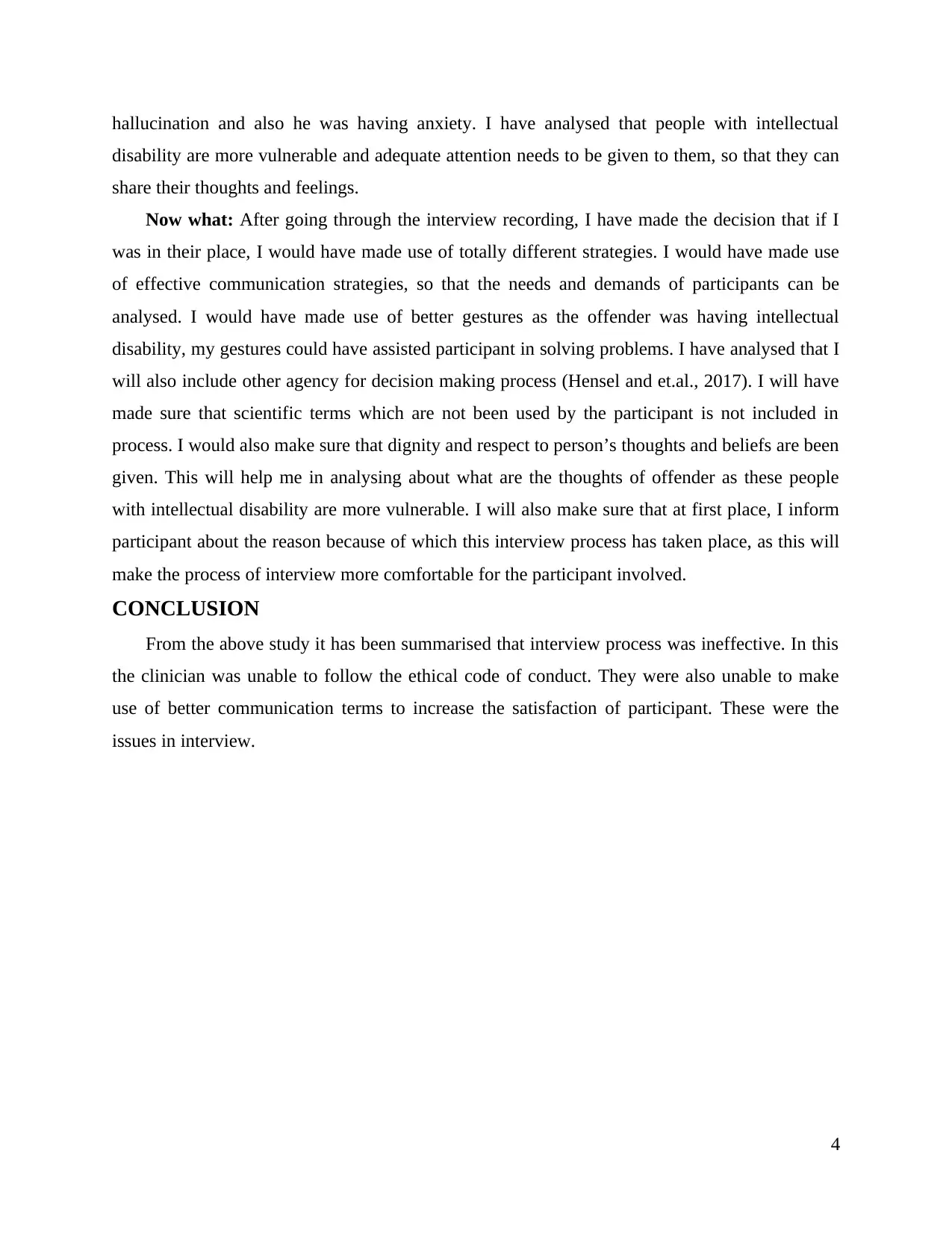
hallucination and also he was having anxiety. I have analysed that people with intellectual
disability are more vulnerable and adequate attention needs to be given to them, so that they can
share their thoughts and feelings.
Now what: After going through the interview recording, I have made the decision that if I
was in their place, I would have made use of totally different strategies. I would have made use
of effective communication strategies, so that the needs and demands of participants can be
analysed. I would have made use of better gestures as the offender was having intellectual
disability, my gestures could have assisted participant in solving problems. I have analysed that I
will also include other agency for decision making process (Hensel and et.al., 2017). I will have
made sure that scientific terms which are not been used by the participant is not included in
process. I would also make sure that dignity and respect to person’s thoughts and beliefs are been
given. This will help me in analysing about what are the thoughts of offender as these people
with intellectual disability are more vulnerable. I will also make sure that at first place, I inform
participant about the reason because of which this interview process has taken place, as this will
make the process of interview more comfortable for the participant involved.
CONCLUSION
From the above study it has been summarised that interview process was ineffective. In this
the clinician was unable to follow the ethical code of conduct. They were also unable to make
use of better communication terms to increase the satisfaction of participant. These were the
issues in interview.
4
disability are more vulnerable and adequate attention needs to be given to them, so that they can
share their thoughts and feelings.
Now what: After going through the interview recording, I have made the decision that if I
was in their place, I would have made use of totally different strategies. I would have made use
of effective communication strategies, so that the needs and demands of participants can be
analysed. I would have made use of better gestures as the offender was having intellectual
disability, my gestures could have assisted participant in solving problems. I have analysed that I
will also include other agency for decision making process (Hensel and et.al., 2017). I will have
made sure that scientific terms which are not been used by the participant is not included in
process. I would also make sure that dignity and respect to person’s thoughts and beliefs are been
given. This will help me in analysing about what are the thoughts of offender as these people
with intellectual disability are more vulnerable. I will also make sure that at first place, I inform
participant about the reason because of which this interview process has taken place, as this will
make the process of interview more comfortable for the participant involved.
CONCLUSION
From the above study it has been summarised that interview process was ineffective. In this
the clinician was unable to follow the ethical code of conduct. They were also unable to make
use of better communication terms to increase the satisfaction of participant. These were the
issues in interview.
4
⊘ This is a preview!⊘
Do you want full access?
Subscribe today to unlock all pages.

Trusted by 1+ million students worldwide
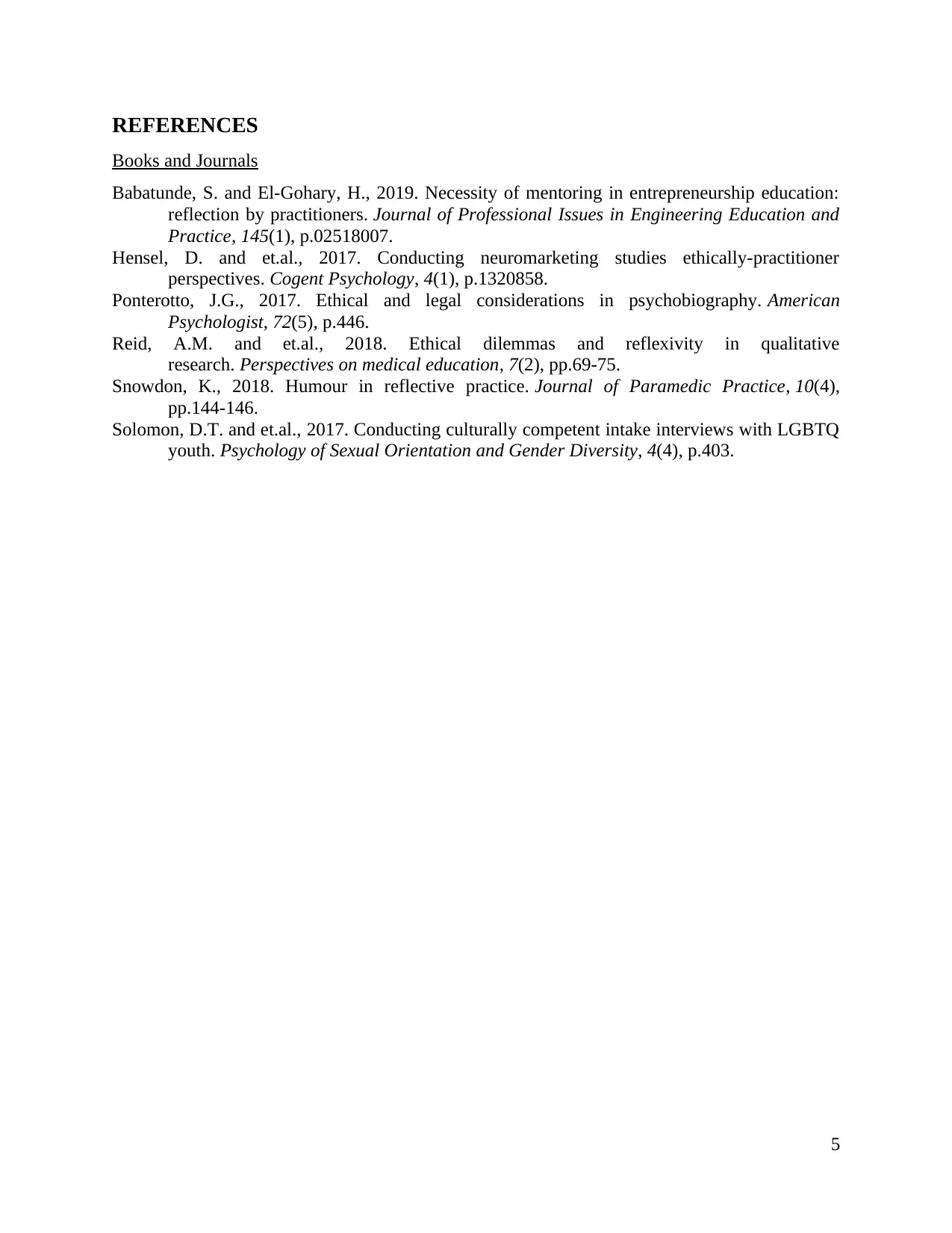
REFERENCES
Books and Journals
Babatunde, S. and El-Gohary, H., 2019. Necessity of mentoring in entrepreneurship education:
reflection by practitioners. Journal of Professional Issues in Engineering Education and
Practice, 145(1), p.02518007.
Hensel, D. and et.al., 2017. Conducting neuromarketing studies ethically-practitioner
perspectives. Cogent Psychology, 4(1), p.1320858.
Ponterotto, J.G., 2017. Ethical and legal considerations in psychobiography. American
Psychologist, 72(5), p.446.
Reid, A.M. and et.al., 2018. Ethical dilemmas and reflexivity in qualitative
research. Perspectives on medical education, 7(2), pp.69-75.
Snowdon, K., 2018. Humour in reflective practice. Journal of Paramedic Practice, 10(4),
pp.144-146.
Solomon, D.T. and et.al., 2017. Conducting culturally competent intake interviews with LGBTQ
youth. Psychology of Sexual Orientation and Gender Diversity, 4(4), p.403.
5
Books and Journals
Babatunde, S. and El-Gohary, H., 2019. Necessity of mentoring in entrepreneurship education:
reflection by practitioners. Journal of Professional Issues in Engineering Education and
Practice, 145(1), p.02518007.
Hensel, D. and et.al., 2017. Conducting neuromarketing studies ethically-practitioner
perspectives. Cogent Psychology, 4(1), p.1320858.
Ponterotto, J.G., 2017. Ethical and legal considerations in psychobiography. American
Psychologist, 72(5), p.446.
Reid, A.M. and et.al., 2018. Ethical dilemmas and reflexivity in qualitative
research. Perspectives on medical education, 7(2), pp.69-75.
Snowdon, K., 2018. Humour in reflective practice. Journal of Paramedic Practice, 10(4),
pp.144-146.
Solomon, D.T. and et.al., 2017. Conducting culturally competent intake interviews with LGBTQ
youth. Psychology of Sexual Orientation and Gender Diversity, 4(4), p.403.
5
1 out of 7
Your All-in-One AI-Powered Toolkit for Academic Success.
+13062052269
info@desklib.com
Available 24*7 on WhatsApp / Email
![[object Object]](/_next/static/media/star-bottom.7253800d.svg)
Unlock your academic potential
Copyright © 2020–2026 A2Z Services. All Rights Reserved. Developed and managed by ZUCOL.


